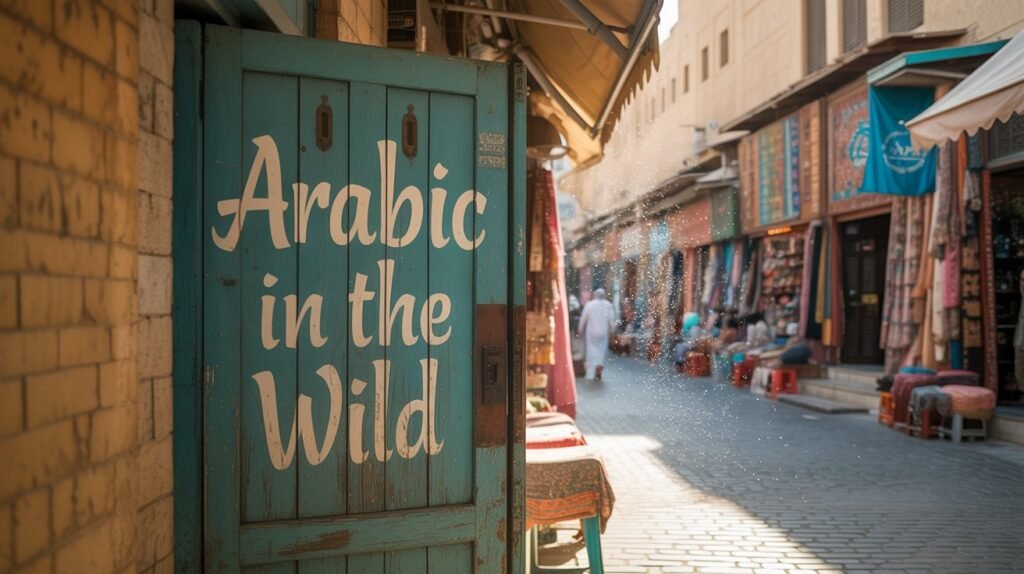You can sit in class for weeks. Scribble down verbs. Roll sounds on your tongue that don’t exist in English. Nod as the teacher corrects your guttural “kh.” But then comes the real moment—the one no textbook prepares you for. You step out into the streets of Dubai, the city humming in three, four, sometimes five languages at once. And suddenly, Arabic isn’t an exercise anymore. It’s alive.
That’s when learning gets interesting. Because Arabic Classes in Dubai are the beginning, not the end. The real lessons? They’re happening in spice-scented souks, in the back of taxis, in late-night cafés where conversations drift between Arabic and English like waves.
The Souk As A Classroom
Wander into the gold souk or the spice market, and it’s sensory overload. Glittering bangles, piles of cinnamon, the voices of vendors calling out prices. This is where a simple “kam?” (how much?) turns into a mini-performance. Your accent is clumsy, maybe. You might get laughed at, but it’s kind laughter. A pat on the back, a quick correction. And that five-second exchange? It sticks with you longer than an hour of drills.
When people sign up for Arabic Classes in Dubai, they imagine whiteboards and vocab lists. They don’t imagine haggling for saffron and walking away feeling like they just passed a speaking test. But that’s how language sneaks in. Messy, unpolished, real.
Taxi Drivers: The Secret Tutors
It’s funny—some of the best Arabic practice happens in the back seat of a car. Taxi drivers in Dubai come from all over, but many know just enough Arabic to banter. A “kayf halak?” (how are you?) is often enough to spark a grin. Before you know it, you’ve exchanged pleasantries, stumbled through a few sentences, and earned yourself a free language correction on the way to work.
That’s what makes Arabic Classes in Dubai different from, say, learning French in Paris. There’s space to fail.
Coffee Shops And Confidence
There’s this little thrill that comes from ordering in Arabic. Nothing dramatic—just asking for coffee, sugar on the side. The first time you get it right, without needing to repeat, you feel ten feet taller.
Cafés in Dubai are perfect playgrounds. Less pressure than a classroom, but just enough interaction to test what you’ve learned. Some of my friends started with a single line: “wahid latte, min fadlik” (one latte, please). Then built from there. A new word every week. One day, you’re just ordering coffee. A few months later, you’re joking with the barista in broken Arabic, and somehow it doesn’t feel broken anymore.
Friends Who Don’t Let You Quit
Of course, the best practice comes with people you trust. Friends who mix Arabic into conversations, who laugh when you say something wrong but don’t let you stop trying. That blend of safety and challenge is gold.
One student told me her Emirati friends would refuse to answer unless she asked in Arabic. A bit cheeky, but effective. Suddenly the phrases from Arabic Classes in Dubai weren’t just “homework.” They were survival skills for keeping the conversation going.
Festivals, Stories, And Sound
Here’s a tip: go to cultural events. Poetry nights. Storytelling sessions. You won’t understand everything. Maybe not even half. But your ears tune in. The cadence, the pauses, the way emotion drapes itself across a line of poetry.
It’s like music—you don’t need to understand every word to feel it. And slowly, you start catching familiar phrases. That rhythm becomes part of your memory. Which means next time someone uses it in conversation, it doesn’t feel alien.
Fear, And Why It Never Quite Goes Away
There’s always that moment. You open your mouth, Arabic perched on your tongue, and you freeze. Fear. The what-ifs flood in. What if they don’t understand? What if I sound like an idiot?
Here’s the secret: you will. Sometimes. Everyone does. Even fluent speakers fumble between dialects and laugh at themselves. The only way forward is to lean into it. Because every mistake is a brick in the path to fluency. And every time you try, the fear shrinks a little.
That’s what the teachers mean when they say Arabic Classes in Dubai are just the foundation. You can’t build confidence in silence. You have to use it, fail with it, get back up with it.
Why Dubai Is Perfect For Learners
This city forgives. People switch between English, Hindi, Tagalog, and Arabic in the same breath. That means you can dive into Arabic, then bail out into English if you hit a wall. No shame. No awkwardness. Just life in a city built on language diversity.
And that’s why learning here works. Because you’re never stranded. You can be brave in Arabic, safe in English, and gradually shift the balance. Little by little.
Small Wins, Big Motivation
The first time you understand a joke. The first time you catch a word on a billboard and don’t need the English translation. The first time you order dinner and the waiter doesn’t switch back to English.
These are the wins that fuel you. They remind you that the time in class was worth it, that the awkward attempts in the souk weren’t wasted. That’s the heartbeat of Arabic Classes in Dubai—turning effort into tiny victories, until one day, speaking feels natural.
Final Thought
Learning Arabic isn’t tidy. It’s not linear. Some days you’ll feel fluent, others you’ll feel like you’ve forgotten everything. But in Dubai, the opportunities to practice are everywhere. Souks. Taxis. Cafés. Friends. Festivals. The whole city is your lab.
So yes, take the classes. Learn grammar. Drill the vocabulary. But don’t leave it locked in the notebook. Use it in the wild, where the mistakes sting for a second but stick forever. That’s how language lives.
Because Arabic Classes in Dubai aren’t the goal—they’re the launchpad. The city itself is where the real learning happens. And in Dubai, you’ve got one of the friendliest, most forgiving classrooms in the world.
Want more to read? Visit dDooks.


